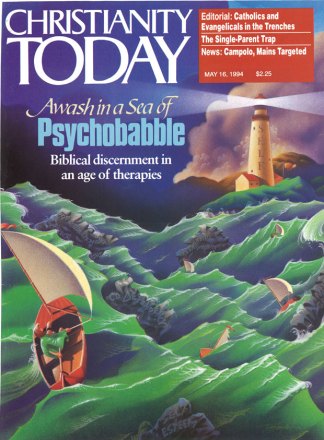In America’s present cultural conflict, it is important to know who your friends are. And today, with greater regularity, evangelicals and conservative Catholics are discovering they have more in common than they thought—more, perhaps, than has been keeping them apart.
The common purpose of maintaining biblical orthodoxy amid cultural chaos has driven a select group of Catholic and evangelical leaders to draft an unprecedented statement of accord: “Evangelicals and Catholics Together: The Christian Mission in the Third Millennium.”
Prominent evangelicals who have publicly endorsed the 25-page document include Pat Robertson of the Christian Broadcasting Network; Bill Bright of Campus Crusade for Christ; Os Guinness of Trinity Forum; and scholars such as Mark Noll, Wheaton College; Thomas Oden, Drew University; and J. I. Packer, Regent College. Among the statement’s Catholic signatories are constitutional attorney William Bentley Ball; economic philosopher Michael Novak, American Enterprise Institute; and theologian Avery Dulles, Fordham University.
The idea was born during discussions between Prison Fellowship Founder Charles Colson and Catholic priest Richard John Neuhaus of the New York City-based organization Religion and Public Life. Neuhaus’s organization coordinated the meetings and discussions that produced the document.
Political motives?
The statement draws attention to common moral and social agendas, which include support for unborn life, the preservation of religious freedom, and parental choice in education. However, it does not address the social issue on which the two communities would likely disagree: legalized gambling.
Perhaps because the statement’s primary drafters are better known for their contributions to public and international policy than for theological expertise, some media outlets have portrayed the effort as a marriage of political convenience. Strongly rejecting this interpretation, Neuhaus says, “By far, the document’s most important single statement … is the affirmation that evangelicals and Catholics are brothers and sisters in Christ. Everything else flows from that.” Tensions between Catholics and evangelicals, especially in Latin America, he says, provided the initial spark for dialogue.
The document cautions against “sheep stealing”: “It is neither theologically legitimate nor a prudent use of resources for one Christian community to proselytize among active adherents of another Christian community.”
Climate of cooperation
“There was a time when evangelicals said if you were a Roman Catholic you can’t be a Christian,” says Geneva College president John White, who was involved with the project from the beginning. The statement, says White, in effect gives grassroots Catholics and evangelicals “permission to work together on major social and cultural issues,” while mandating that differences “be expressed in a more nuanced and civil way.”
Over recent decades, several factors have contributed to the growing mutual respect between evangelicals and Catholics, including the ecumenical openness of the Second Vatican Council, charismatic renewal, the pro-life movement, and Pope John Paul II’s openness.
Acknowledging differences
The statement officially represents no evangelical organization nor the Catholic Church, though Neuhaus says that “appropriate parties at the Holy See” gave the effort their “strongest encouragement.”
The document acknowledges “deep and longstanding theological differences between evangelicals and Catholics.” Either stated or implied throughout, however, is the assertion that these differences do not have an impact on Christianity’s core of essential beliefs and thus should not prevent the communities from working together.
Not surprisingly, the statement has drawn ire from the fundamentalist camp, where boundaries of acceptable theological formulation are much more tightly drawn. Bob Jones III regards it as evidence that “the ecumenical church, which will be the church of the Antichrist, is rapidly forming.”
According to Neuhaus, earlier drafts sought to distinguish between evangelicals and fundamentalists, but that proved problematic. For purposes of the document, he says, evangelicals are those who describe themselves as such.
By Randy Frame.










